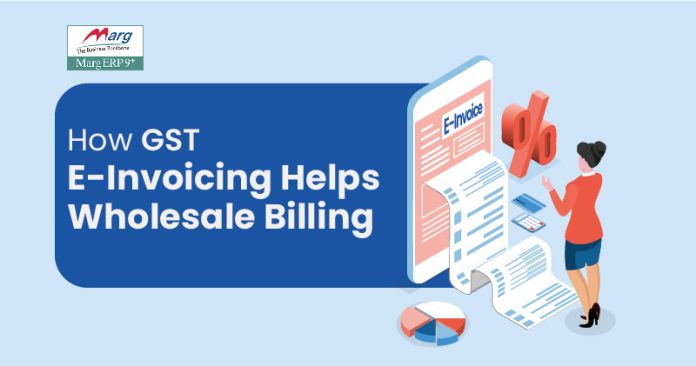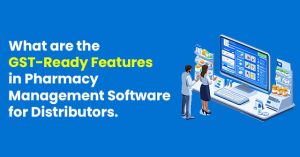The last two to three years have witnessed tremendous business ecosystems undergoing digitalization in India. The most impactful of these changes include the enactment and subsequent reforms under the GST. GST E-Invoicing is one such reform that streamlined taxation processes and brought huge benefits onto the scene for businesses, especially those in the wholesale sector. It transforms the generation, sharing, and storage of invoices in a manner that simplifies complex operations like wholesale billing but enhances compliance and transparency.
What is GST E-Invoicing?
E-Invoicing GST is a system introduced by the Government of India where B2B invoices are electronically authenticated by the GST Network (GSTN) before they are shared with buyers. Under this system, businesses must generate invoices in a prescribed format and then upload them to the Invoice Registration Portal (IRP). Once the IRP validates the invoice, it assigns a unique Invoice Reference Number (IRN), digitally signs the invoice, and returns it to the business. This digitally authenticated invoice is what we refer to as an E-Invoice.
Since its rollout on October 1, 2020, for businesses with a turnover exceeding ₹500 crore, GST E-Invoicing has gradually been made mandatory for companies with lower turnovers. The system helps integrate tax reporting systems with invoicing in real time, which reduces errors and automates the filing process.
The Importance of E-Invoicing for Wholesale Billing
Wholesale companies generally involve a large volume of transactions with a complex supply chain. Here, an effective billing system is very much required to accurately record issues concerning the invoices. In the case of traditional methods of invoicing, there will be a chance of making a human error, which can cause disputes, delays in payments, and also compliance-related issues. E-invoicing simplifies such a process by automating it, reducing the possibility of errors, and providing real-time tracking of invoices.
Here’s a breakdown of how GST E-Invoicing benefits wholesale billing:
Streamlines Billing Processes
Wholesale deals are in huge volumes and bulk orders. It is rather cumbersome and time-consuming to maintain every manual generation and processing of an invoice from each transaction. E-invoicing helps avoid all the above complications by generating invoices electronically, which then receive instantaneous validation from the GST portal.
Invoices should have a standardized format. If not, businesses would be at risk of some common errors such as mismatched invoice details or errors in tax calculation or duplication. Under this system, every invoice is filtered at the source before it is passed to the buyer, making the entire process of billing faster and more reliable.
Reduces Errors and Enhances Accuracy
For example, human typing in accordance with traditional billing practices increases the errors resulting from processing enormous transaction volumes in the wholesale segment. Such mistakes can also result in an awkward inconvenience, such as there being a discrepancy between the invoices or issues arising with the clients where perhaps there was some dispute over the GST return.
GST e-invoicing eliminates all these mistakes as it automatically generates the invoices. Since all the invoices are generated in a standard format, businesses can avoid the possibility of entering wrongful information or computing the wrong amount of GST for any invoice. The real-time validation of invoices also ensures that every invoice is errorless and follows GST norms before being shared with the buyer.
Ensures GST Compliance
Probably one of the biggest challenges for a wholesale business is being compliant with GST because the changes in tax rules keep evolving. Non-compliance can lead to penalties, delayed refunds, or scrutiny from the tax authorities.
GST E-Invoicing ensures that every invoice generated is perfectly according to the current GST norms. The system automatically validates the invoices with GSTN, thereby confirming the right tax calculation, and all fields are filled up as per the requirement of the government. Thus, it easily minimizes errors in the return filing of GST, and therefore compliance becomes much easier for wholesale businesses.
Further, the bill validated by the IRP will automatically become available for transmission to the GST system and e-way bill portal if required, thereby obviating the headache of separate filings.
Facilitates Real-time Invoice Tracking
This is especially important for large wholesale businesses dealing with hundreds and thousands of invoices on the client’s, supplier’s, and distributor’s ends. E-Invoicing enables real-time tracking of every invoice at the GSTN portal and ensures that all invoices can be followed through.
This transparency in the process of invoicing keeps the buyers and sellers aware of their respective invoice status. With real-time tracking, businesses can be sure that there are no delays in the processing of invoices, payments, or deliveries. This helps to ensure the timely reconciliation of accounts without any discrepancies arising at the time of GST return filing or audits.
Improves Cash Flow Management
In a wholesale business, where transactions are in large volumes and payments are also done on such large scales, efficient billing and invoicing will play a significant role in maintaining healthy cash flows. Delayed invoicing or incorrect bills can not only delay the payment but also create disharmony in cash flow.
There is also GST E-Invoicing would therefore enable wholesalers to ensure that the invoices are created and shared in real-time with the clients, thus eliminating delays in payments. The system further avails an unalterable, authenticated copy of the invoice that would cut on any kind of disputes about discrepancies in the invoices. Through the enhancement of the invoicing process, businesses can guarantee continuity of the cash flow, improving liquidity and financial management.
Boosts Transparency and Reduces Fraud
Wholesale billing is believed to be risky because there is always a possibility of fake invoicing going out, or on purpose, undervaluing transactions to avoid taxes. E-invoicing promotes transparency in the billing process as every invoice is authenticated through GSTN.
After uploading to the IRP, an invoice is stored in the GSTN database, and a digitally signed copy is issued both to the buyer and the seller. In this way, the trail of the transaction becomes much more transparent and traceable, making fraud in invoicing and tax evasion improbable, while on the GST portal, it is possible to ascertain the authenticity of the invoice by both the buyer and the seller.
Simplifies Reconciliation of Sales and Purchases
Reconciling the sales data and the purchase data would be one of the most important aspects of wholesale business accounts management, especially in the context of GST return filing. In general, the traditional method causes reconciliation difficulties between the sales and purchase registers.
Now, GST E-Invoicing, makes this process simpler by recording all invoices in real-time on the GST portal. Then, the possibility of any discrepancies between records maintained by the buyer and the seller will not arise. Thus, reconciliation would happen easily and accurately. Moreover, due to the fact that the IRP would provide a copy of the invoice to the buyer and GSTN, the same set of data is expected from both parties, where the chances of a dispute will be lesser.
Supports Automation and Integration with ERP Systems
ERP is the system applied by most wholesale companies to maintain their inventory, accounts, and supply chain processes. GST E-Invoicing supports integration with ERPs where companies will be supported to automate their billing process.
Even the generation of E-Invoices can be directly done from their ERP systems removing the manual upload at the GSTN portal. Through this integration, the whole process of billing starts and ends from order generation to submission of an invoice automatically, without any manual intervention and thus with less possibility of error. This will bring down administrative costs and would increase operational efficiency in wholesale businesses substantially.
Reduces Audit Risks and Ensures Compliance during Audits
GST E-Invoicing ensures all invoices issued throughout the value chain are up to date with respect to the latest tax norms, giving full benefit to the AEs in terms of better tracking of their records and their updates. Therefore, wholesale business enterprises may easily provide digitally signed invoices stored in the GSTN database during the audit regarding tax compliance.
All the invoices that are registered and authenticated on the GST portal mean that business houses do not carry any risk of mismatches in their accounts during any sort of audit. This reduces the probability of penalties or scrutiny from tax authorities, thus providing them peace of mind and smoothing the process of an audit for wholesale businesses.
Conclusion
Since the wholesale business enterprise operates in such a highly competitive and fast-paced sector, efficient billing systems are quite essential in ensuring its success. GST E-Invoicing, thereby, offers a reliable, streamlined, and transparent method of invoicing to wholesale businesses that would reduce any possibility of human error, ensure compliance, improve cash flow, and augment its operational efficiency at large. Wholesale businesses can focus on growing their operations while being attuned to being tax-compliant without overburdening their administration.
As India grows increasingly digital across its economy, businesses handling wholesale items that implement GST E-invoicing will be pretty well placed to track the complexity of modern-day billing, tax compliances, and supply chains.
Read More:-
- How Pharmacy Billing Software Ensures GST Compliance in India. GST compliance is mandatory as per Section 149 of the GST Act, 2017. Union Government is legally authorised to evaluate and rate every taxpayer (chemist and pharma companies) based on their performance in complying with mandatory GST rules and… Read more: How Pharmacy Billing Software Ensures GST Compliance in India.
- What are the GST-Ready Features in Pharmacy Management Software for Distributors. According to Section 24 of the CGST Act, GST registration, returns, and filing are compulsory for pharma distributors, pharma retail shops, and other businesses. It defines turnover limits, rules regarding key provisions, processes, and more. GST compliance… Read more: What are the GST-Ready Features in Pharmacy Management Software for Distributors.
- What is ECOD Secure and Everything You Need to Know About It. In today’s fast-evolving pharmaceutical landscape, efficient data management and digital connectivity are no longer luxuries, they are essentials for growth. From pharmacies to distributors and manufacturers, accurate insights into sales, stock and purchasing trends are… Read more: What is ECOD Secure and Everything You Need to Know About It.
- Pharmacy Problems in Small Towns and How Advanced Billing Software Fixes Them Running a pharmacy in a small town or rural area in India is not easy. Patients depend on the chemist for everything from basic fever tablets to life-saving medicines often… Read more: Pharmacy Problems in Small Towns and How Advanced Billing Software Fixes Them
























